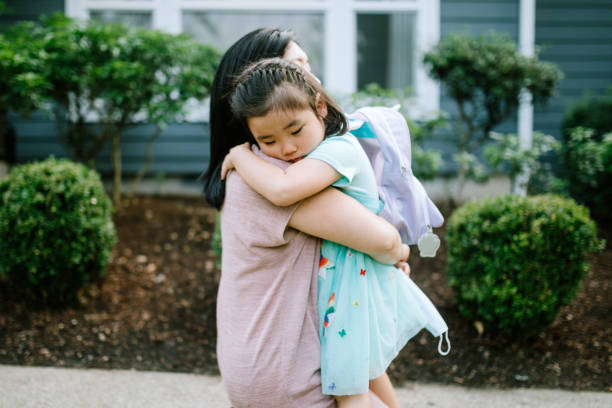Passing anxiety to kids is a concern for many parents, especially when they struggle with anxiety themselves. Children observe their parents closely, and when they see anxious behaviour, they might begin to feel anxious too. However, with a few mindful steps, you can avoid passing anxiety to kids and help them develop healthier coping mechanisms.
Recognise Your Own Anxiety
It’s important to recognise your own anxiety first. If you notice your child showing signs of anxious behaviour, don’t be hard on yourself. Everyone experiences stress, and it’s easy for children to pick up on their parents’ emotions. What matters is how you manage your anxiety moving forward.
Jamie Howard, PhD, explains that there’s no need to feel guilty when dealing with anxiety. Instead, focus on managing your stress effectively. This will not only help you but also show your child how to handle their own emotions.
Manage Stress Before It Passes to Your Kids
One of the best ways to avoid passing anxiety to kids is by managing your own stress. Children naturally look to their parents for how to react to situations. If they see you staying calm under pressure, they’ll learn that they don’t need to panic in difficult situations either.

Image from iStock
Mindfulness is a great way to stay in the present and prevent anxiety from taking over. You can try simple techniques like:
- Belly breathing: Place one hand on your stomach and one on your chest, and slowly breathe in and out, focusing on your breath.
- Muscle relaxation: Tense a group of muscles, hold for a few seconds, then release, noticing how the tension melts away.
These simple exercises help you stay calm and focused, making it easier to keep anxiety in check.
Identify Your Triggers
Everyone has specific things that trigger anxiety. Whether it’s a stressful news report or a hectic morning routine, knowing your triggers can help you manage them better. Once you identify what heightens your stress, you can take steps to minimise those situations, especially around your child.
If managing your anxiety alone feels too difficult, seeking help from a professional is a good idea. This not only benefits you but also teaches your child that it’s okay to ask for help when things feel overwhelming.
Model Healthy Reactions
Kids learn by watching how you react to stress. If you can remain calm during difficult moments, they’ll see that stress is manageable. This helps them develop a sense of control over their own anxiety.

Image from iStock
For example, if your child is scared, calmly discuss the situation with them. Ask them what the real chances are that something bad will happen. This encourages them to think rationally, which can reduce their anxiety in the future.
Talk About Anxiety Openly
It’s okay for your child to see that you feel anxious sometimes, but it’s important to explain why. If you have a stressful moment, discuss it with your child once everything has calmed down. You might say something like, “I felt anxious this morning because we were running late, but there are better ways I can manage that stress.”
This approach normalises anxiety and shows your child that it’s something everyone deals with, but it can be controlled. Being open about your own emotions helps your child understand that they’re not alone in feeling anxious.
Make a Plan Together
Creating a plan for stressful situations can reduce anxiety for both you and your child. If mornings are particularly stressful, work together to create a routine that makes things smoother. You can involve your child by offering rewards for cooperation, making it a positive experience for both of you.
However, be careful not to place too much responsibility on your child for managing your stress. They should understand that while they can help, managing anxiety is ultimately up to you.
Build a Support System
Parenting can be challenging, especially when you’re dealing with anxiety. Having a strong support system makes a world of difference. Whether it’s close friends, family members, or a therapist, having people to lean on when you feel overwhelmed can help you manage stress better.
Sharing your experiences with trusted people in your life makes it easier to cope and helps prevent passing anxiety to kids. It’s a reminder that you’re not in this alone.
Takeaway
Passing anxiety to kids is a real concern, but it’s not unavoidable. By recognising your own anxiety, managing stress, and talking openly with your child, you can prevent them from absorbing your anxiety. Modelling healthy behaviours and building a support system also goes a long way in helping them grow into emotionally resilient individuals.
ALSO READ:
Morning Meditation Benefits: 5 Minutes to Lower Stress and Anxiety
Banish Morning Anxiety: Tips and Tricks for a Calmer, More Productive Day
‘I Have My Ways’: Tony Leung on Overcoming His Social Anxiety
 Together Against RSV
Together Against RSV SG60
SG60 Pregnancy
Pregnancy Parenting
Parenting Child
Child Feeding & Nutrition
Feeding & Nutrition Education
Education Lifestyle
Lifestyle Events
Events Holiday Hub
Holiday Hub Aptamil
Aptamil TAP Recommends
TAP Recommends Shopping
Shopping Press Releases
Press Releases Project Sidekicks
Project Sidekicks Community
Community Advertise With Us
Advertise With Us Contact Us
Contact Us VIP
VIP Rewards
Rewards VIP Parents
VIP Parents
